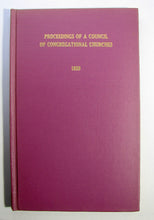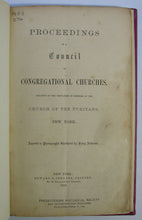Anderson, Finley [stenographer]. Proceedings of a Council of Congregational Churches, relative to the privileges of members of the Church of the Puritans, New York. New York: Edward O. Jenkins, Printer, 1859. First Edition. [6107]
Bound in lavender library cloth, gilt title to front, gilt call number to spine. 9 1/2 x 6 inches, 92 pp., ink historical society stamp on tp. Good. Hardcover.
In May of 1858 Dr. Cheever, of the Church of the Puritans in NYC, preached at the anniversary gathering of the American Abolition Society a sermon entitled, The Fire and Hammer of God's Word against the Sin of Slavery. The Society had it printed up and distributed. In it he offered a scathing rebuke of the Dred Scott case, the constitutionality of chattel slavery, and the denial of citizenship to Negros. These are examples of the views which led to a disruption in his church.
The abolitionist agitations of Dr. Cheever offended members of his congregation. He was called upon by some to resign, the rules of the church were changed and officers were removed at the annual meeting, June, 1857. The actions of the church were made public in the press. Dr. Cheever survived the rebellion, and a faction, deemed Presbyterian in their views of slavery, attempted to withdraw their membership, asking for letters of referral. The women were granted such, but the men were not. Several of the men were Deacons and thought that they were denied proper consideration and charity in the refusal. What followed was an acrimonious public squabble over the affair, with reports and purportedly private letters being published in the press. The faction was not only denied letters of referral, they were "deemed no longer members of the same or in any way subject to its watch and care." The aggrieved party, after gaining no satisfaction through appeals to the Church of the Puritans, called for an ex parte Council of Congregational churches to hear and decide upon the matter. This is the record of that Council.
Noah Porter, D.D., represented the appellants in the case.
The case is brought that the manner of their dismissal was not according to polity of the Congregational churches, and the Council does rule that this was so. The Council concerns itself with the matter of polity, rather than taking up the issue of slavery.
George Barrell Cheever, D.D., b. 1807 in Maine; pastor of the Allen Street Presbyterian Church in New York, 1838-44; editor of the New York Evangelist, 1845; and pastor of the Church of the Puritans, Union Square, New York, 1846-67, after which he was engaged in literary work. Died in 1890.
Cheever was an uncompromising reformer and controversialist. Early in his Salem, Mass. pastorate he attacked Unitarianism (the leading religion of the town) in a Fourth-of-July oration. This produced an agitated newspaper controversy and much local excitement. Soon after this there appeared from his pen "The True History of Deacon Giles' Distillery" in the Salem Landmark, in which with changed names he told the story of a distillery in Salem whose proprietor was a church deacon who sold Bibles. This produced a violent upheaval. The press was destroyed by a mob and Cheever was assaulted on the street by the foreman of the distillery. He was sued for libel, fined $1,000, and imprisoned for one month.
In 1841, after his removal to New York, he engaged in a controversy in which he took the stand of a pronounced advocate of capital punishment, which he defended on biblical grounds; and a little later in another with the Roman Catholics against the abolition of compulsory Bible reading in the public schools. He was opposed to the running of Sunday trains and an outspoken critic of the ritualistic tendencies in the Episcopal Church. During the entire slavery agitation he was a fearless champion of the cause of abolition and the full citizenship and education of the Negro. His large library was bequeathed to Howard University. He was a brilliant writer and his literary work covered the entire period of his active life. As a preacher he was a pronounced Evangelical and an orthodox exponent of that variety of Calvinism known as the "New England Theology." – adapted from DAB.







